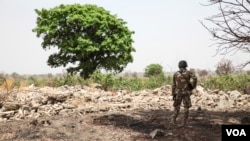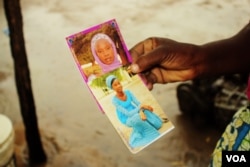Officials in Nigeria’s war-torn northeast are rebuilding damaged schools and moving displaced people out of classrooms in an effort to get students who were disrupted by years of Boko Haram violence back to their studies.
With 10.5 million students — nearly one in three — out of the classroom, Nigeria has one of the world’s largest populations of primary school-age children who are out of school, the U.N. Children’s Fund announced this week.
The seven-year insurgency by Boko Haram has had a major impact on education in the country’s northeastern corner. One million children have been forced to leave school because of the violence, UNICEF says. About 1,200 schools have been damaged, looted or turned into shelters for displaced people.
Borno state, where the insurgency got its start and which was the scene of some of the most intense fighting, will start its term later this month now that the militants have gone. State education minister Musa Inuwa Kubo said the local governments were taking steps to get classrooms ready for returning students.
Internally displaced people have been relocated, and "we have renovated all the schools that the IDPs stayed in," Kubo said.
Boko Hararm roughly translates to "western education is forbidden." The group has murdered teachers and students, and destroyed more than 140 schools in Borno state alone, Kubo said.
Rebuilding under way
Reconstruction has started on some schools that have been destroyed, particularly in towns near the state capital, Maiduguri, Kubo said.
In Chibok, site of the mass Boko Haram kidnapping of 279 schoolgirls from the town’s boarding school in 2014 that sparked global outrage, Nigerian army engineers have started rebuilding.
But some parts of Borno remain too dangerous to access, Kubo said. Fifteen schools in these areas will not open when classes resume.
Years of fighting have forced about 2.7 million people to flee across Nigeria and its neighboring regions. That’s caused a surge of displaced people into cities such as Maiduguri.
Toby Fricker, a UNICEF spokesman, said some schools will face a 180 percent increase in students.
Easier access to school?
But this influx may also offer some advantages, Fricker said. Borno is one of Nigeria’s poorest states and school attendance was low even before the insurgency.
"You really have a lot of displaced people who are in towns or even in internally displaced camps and in some cases have easier access to education because of the location," requiring less travel than before, Fricker said.
The moves to rebuild schools could not come soon enough. While the insurgents damaged the school in Chibok during the kidnapping, the government leveled it completely soon afterward.
Parents complained that the demolition left their children with no place to continue their education.
If her abducted daughter is rescued, Esther Yakubu says she would let Dorcas Yakubu finish her education at the new school – on one condition.
"She cannot live in the school anymore," Yakubu said. "You know, if she’s with me at home, just going to the school to write her paper and come back home, this [kidnapping] would not even happen to her."






